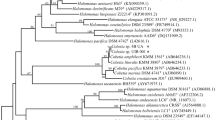Abstract
Ant-300, a psychrophilic marine vibrio isolated from the Antarctic convergence, was tested for survival under conditions simulating those expected in situ for this organism. In particular, the organism's response to increased hydrostatic pressure was examined. Under a hydrostatic pressure of 250 atm, the viability of Ant-300 was reduced over 755 in growth media and under starvation conditions after 3 and 2 days, respectively. However, if the cells were starved for 1 week prior to pressurization of the starving suspension, 100% viability was maintained for over 6 weeks at the same pressure. After 10 weeks, the viability of a population of cells suspended for 1 week in natural or artificial seawater at a density of 103 cells ml−1 prior to pressurization of the suspension was 2 to 3 times greater than 1 atm controls. The data indicate that starvation conditions are a contributory if not the primary factor for the barotolerance of this organism in Antarctic waters. The data also indicate that under certain conditions, not unlike those expected in situ, hydrostatic pressure actually increases the survival of this organism under low nutrient conditions.
Similar content being viewed by others
Literature Cited
Gordon, A.L.: Structure of Antarctic waters between 20°W and 170°W. Antarctic Map Folio Ser. 6, (1967). (Folio Am. geogr. Soc.)
Gordon, A.L. and R.D. Goldberg: Circumpolar characteristics of Antarctic waters. Antarctic Map Folio Ser. 13, (1970). (Folio Am. geogr. Soc.)
Morita, R.Y.: Statement delivered during Proceedings of the 4th International Interdisciplinary Conference, In: Marine microbiology, p. 97. Ed. by C.H. Oppenheimer. New York: New York Academy of Sciences 1968
—: Hydrostatic pressure effects on microorganisms. In: Effect of the ocean environment on microbial activities, pp 133–138. Ed. by R.R. Colwell and R.Y. Morita. Baltimore: University Park Press 1974
Novitsky, J.A. and R.Y. Morita: Morphological characterization of small cells resulting from nutrient starvation of a psychrophilic marine vibrio. Appl envirl Microbiol. 32, 617–622 (1976)
——: Survival of a psychrophilic marine vibrio under long-term nutrient starvation. Appl. envirl Microbiol. 33, 635–641 (1977)
Oppenheimer, C.H. and C.E. ZoBell: The growth and viability of 63 species of marine bacteria as influenced by hydrostatic pressure. J. mar. Res. 11, 10–18 (1952)
Sieburth, J. McN., R.D. Brooks, R.V. Gessner, C.D. Thomas and J.L. Tootle: Microbial colonization of marine plant surfaces as observed by scanning electron microscopy. In: Effect of the ocean environment on microbial activities, pp 418–432. Ed. by R.R. Colwell and R.Y. Morita. Baltimore: University Park Press 1974
Author information
Authors and Affiliations
Additional information
Communicated by M.R. Tripp, Newark
Technical Paper No. 4907, Oregon Agricultural Experiment Station.
Rights and permissions
About this article
Cite this article
Novitsky, J.A., Morita, R.Y. Starvation-induced barotolerance as a survival mechanism of a psychrophilic marine vibrio in the waters of the Antarctic convergence. Mar. Biol. 49, 7–10 (1978). https://doi.org/10.1007/BF00390725
Accepted:
Issue Date:
DOI: https://doi.org/10.1007/BF00390725




